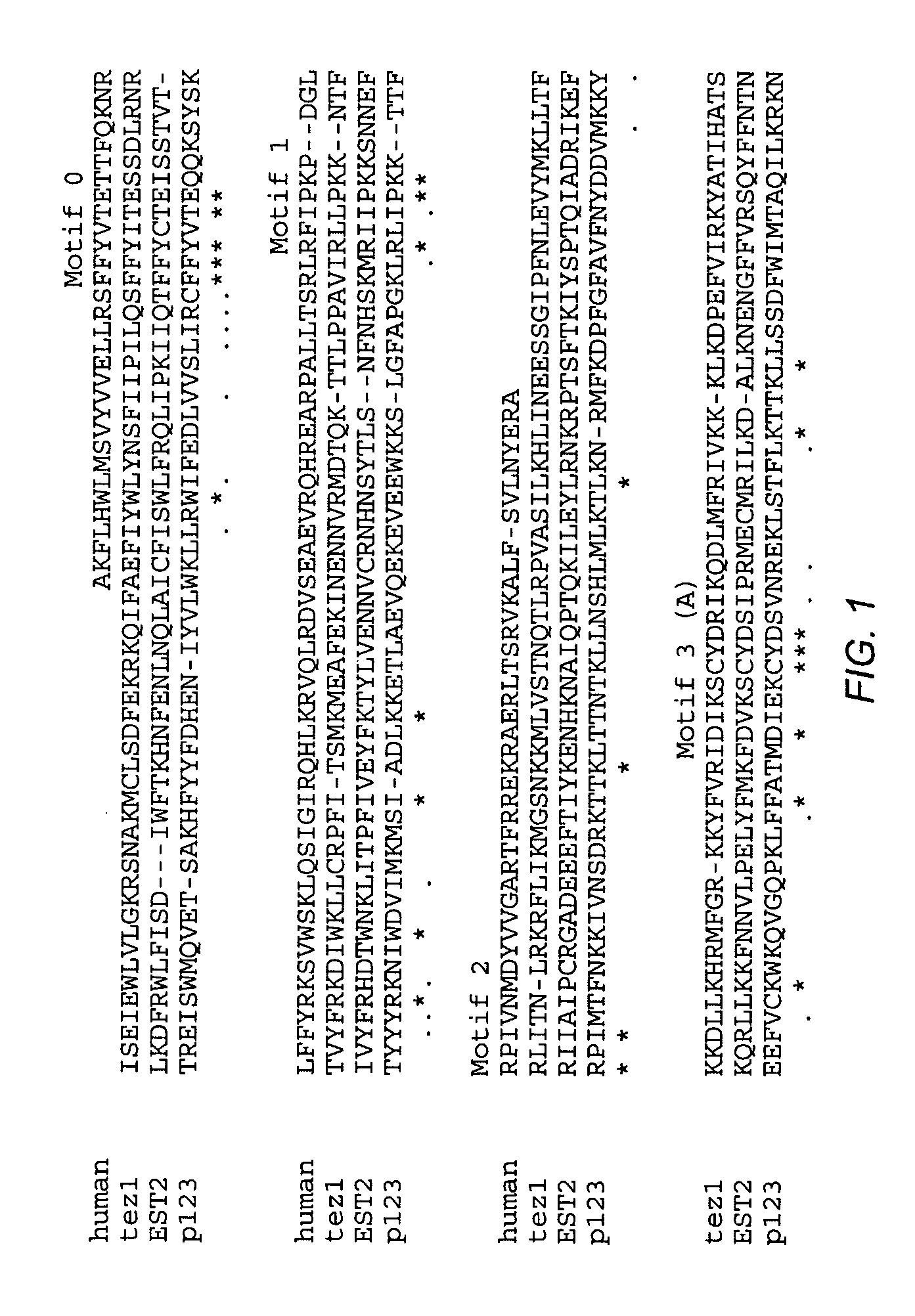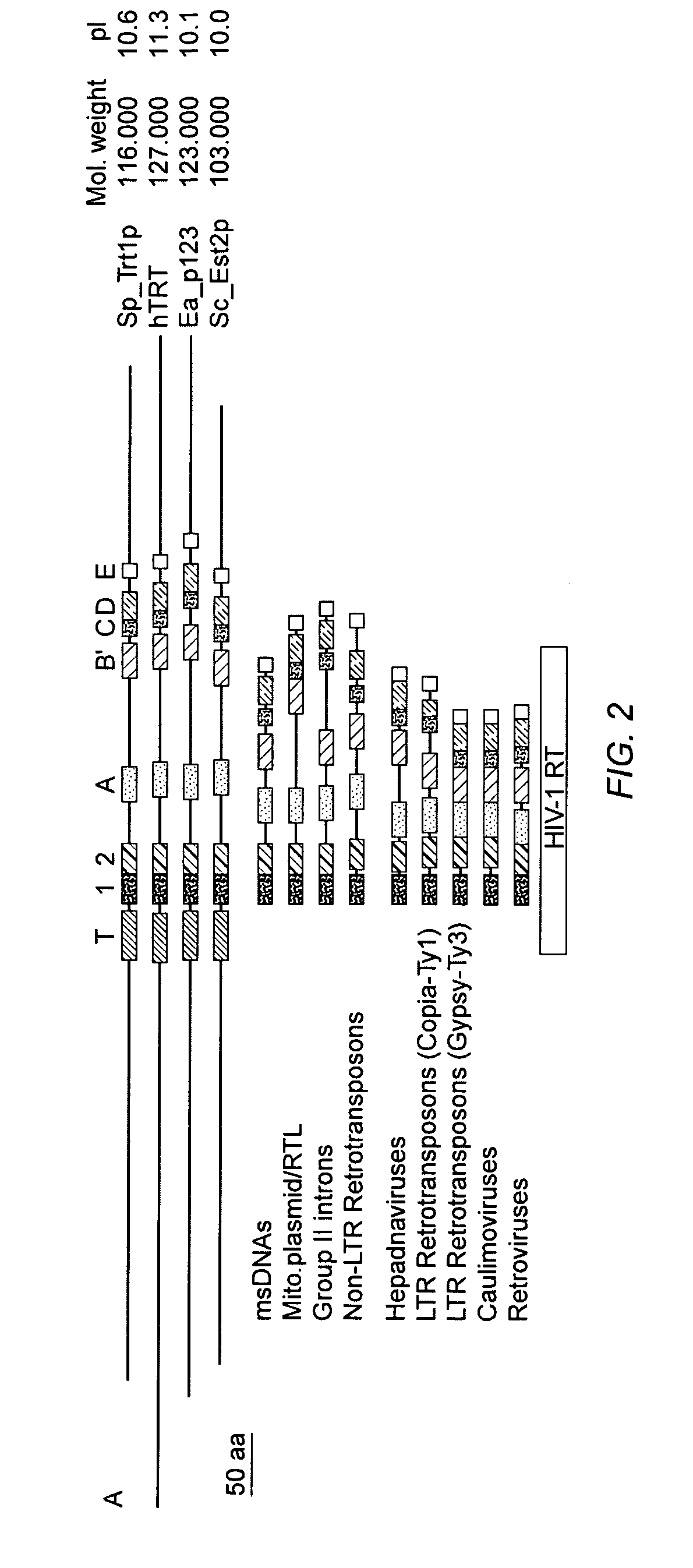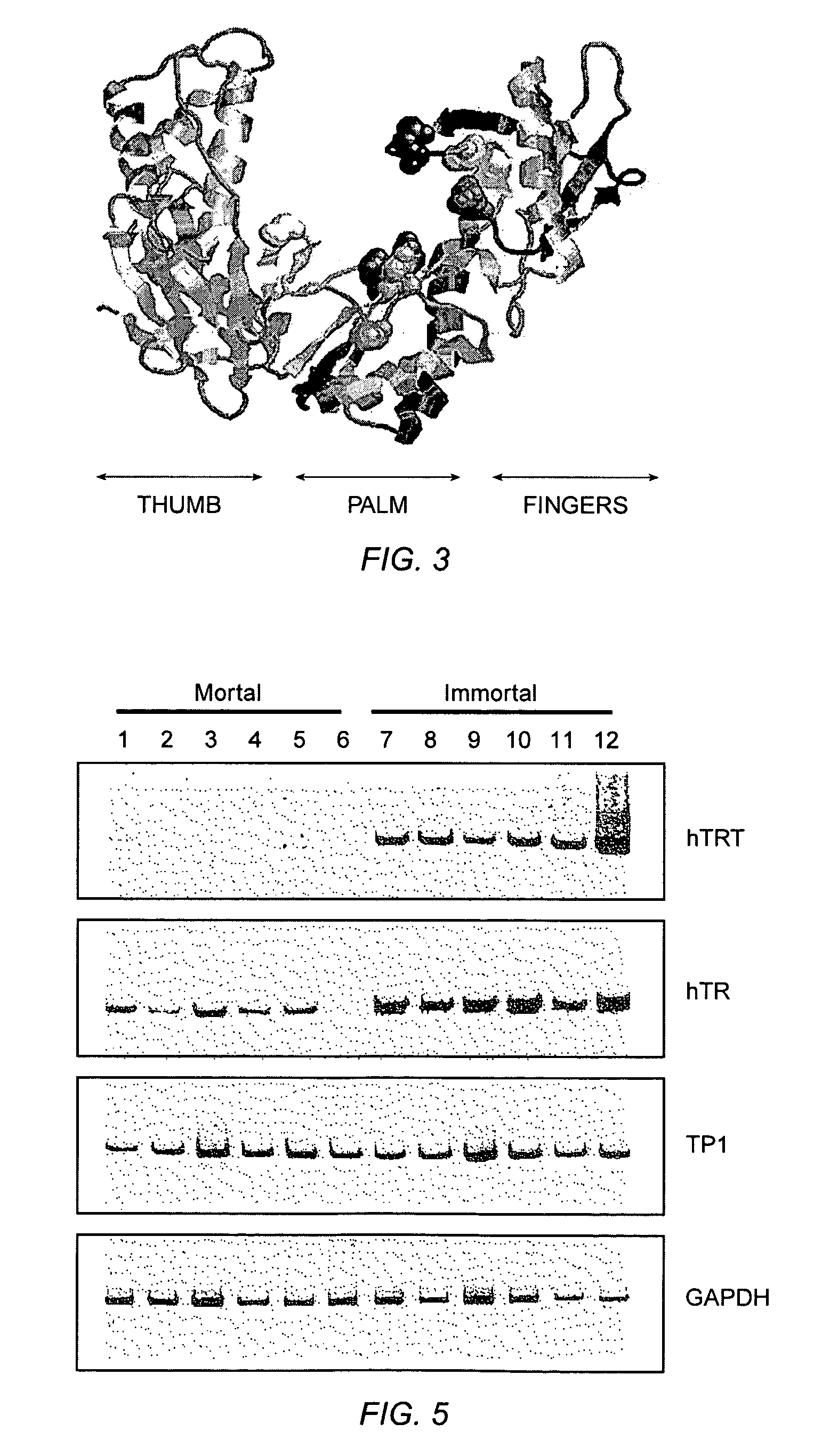Methods for detection of human telomerase reverse transcriptive protein
a reverse transcriptive protein and telomerase technology, applied in the field of new nucleic acids encoding the catalytic subunit of telomerase, can solve the problems of difficult purification of telomerase rnp, difficult characterization of protein components of telomerase, and extremely low levels of telomerase in cells, so as to increase the proliferative capacity of vertebrate cells and increase the proliferative capacity
- Summary
- Abstract
- Description
- Claims
- Application Information
AI Technical Summary
Benefits of technology
Problems solved by technology
Method used
Image
Examples
example 1
Isolation of Telomerase Proteins and Clones
[0646]The following example details the isolation of telomerase proteins and clones from various organisms, including the euplotes p. 123, hTRT, TRT and S. pombe TRT telomerase cDNA clones.
A. Background
[0647]i) Introduction
[0648]This section provides an overview of the purification and cloning of TRT genes, which is described in greater detail in subsequent sections of this Example. While telomerase RNA subunits have been identified in ciliates, yeast and mammals, protein subunits of the enzyme have not been identified as such prior to the present invention. Purification of telomerase from the ciliated protozoan Euplotes aediculatus yielded two proteins, termed p123 and p43 (see infra; Lingner (1996) Proc. Natl. Acad. Sci. U.S.A. 93:10712). Euplotes aediculatus is a hypotrichous ciliate having a macronucleus containing about 8×107 telomeres and about 3×105 molecules of telomerase. After purification, the active telomerase complex had a mole...
example 2
Correlation of hTRT Abundance and Cell Immortality
[0777]The relative abundance of hTRT mRNA was assessed in six telomerase-negative mortal cell strains and six telomerase-positive immortal cell lines (FIG. 5). The steady state level of hTRT mRNA was significantly increased in immortal cell lines that had previously been shown to have active telomerase. Lower levels of the hTRT mRNA were detected in some telomerase-negative cell strains.
[0778]RT-PCR for hTRT, hTR, TP1 (telomerase-associated protein related to Tetrahymena p80 [Harrington et al., 1997, Science 275:973; Nakayama et al., 1997, Cell 88:875]) and GAPDH (to normalize for equal amounts of RNA template) was carried out on RNA derived from the following cells: (1) human fetal lung fibroblasts GFL, (2) human fetal skin fibroblasts GFS, (3) adult prostate stromal fibroblasts 31 YO, (4) human fetal knee synovial fibroblasts HSF, (5) neonatal foreskin fibroblasts BJ, (6) human fetal lung fibroblasts IMR90, and immortalized cell li...
example 3
Characterization of an hTRT Intronic Sequence
[0780]A putative intron was first identified by PCR amplification of human genomic DNA, as described in this example, and subsequently confirmed by sequencing the genomic clone λGΦ5 (see Example 4). PCR amplification was carried out using the forward primer TCP1.57 paired individually with the reverse primers TCP1.46, TCP1.48, TCP1.50, TCP1.52, TCP1.54, TCP1.56, and TCP1.58 (see Table 2). The products from genomic DNA of the TCP1.57 / TCP1.46, TCP1.48, TCP1.50, TCP1.52, TCP1.54, or TCP1.56 amplifications were approximately 100 basepairs larger than the products of the pGRN121 amplifications. The TCP1.57 / TCP1.58 amplification was the same on either genomic or pGRN121 DNA. This indicated the genomic DNA contained an insertion between the sites for TCP1.58 and TCP1.50. The PCR products of TCP1.57 / TCP1.50 and TCP1.57 / TCP1.52 were sequenced directly, without subcloning, using the primers TCP1.39, TCP1.57, and TCP1.49.
[0781]As shown below, the 10...
PUM
| Property | Measurement | Unit |
|---|---|---|
| Fraction | aaaaa | aaaaa |
| Fluorescence | aaaaa | aaaaa |
Abstract
Description
Claims
Application Information
 Login to View More
Login to View More - R&D
- Intellectual Property
- Life Sciences
- Materials
- Tech Scout
- Unparalleled Data Quality
- Higher Quality Content
- 60% Fewer Hallucinations
Browse by: Latest US Patents, China's latest patents, Technical Efficacy Thesaurus, Application Domain, Technology Topic, Popular Technical Reports.
© 2025 PatSnap. All rights reserved.Legal|Privacy policy|Modern Slavery Act Transparency Statement|Sitemap|About US| Contact US: help@patsnap.com



